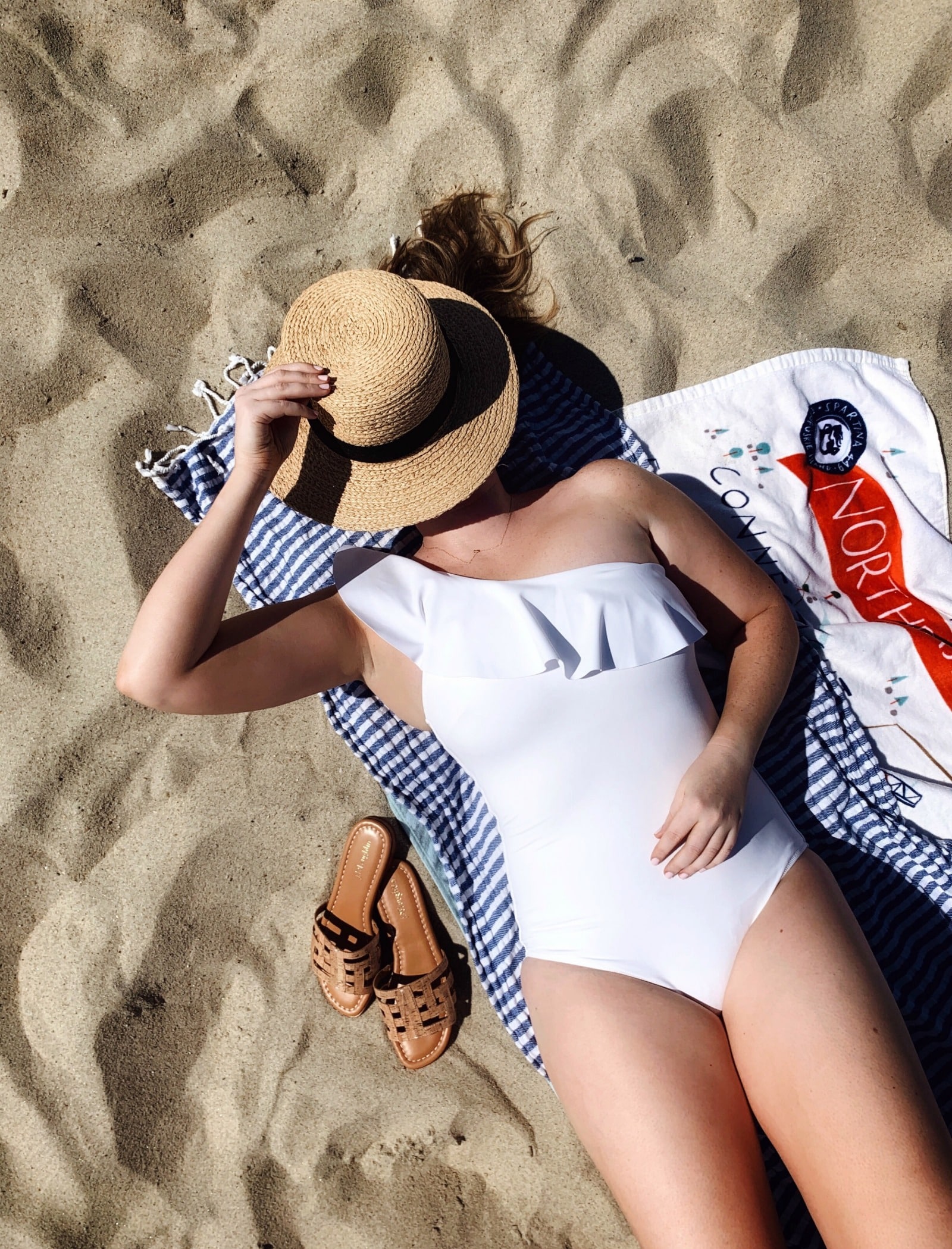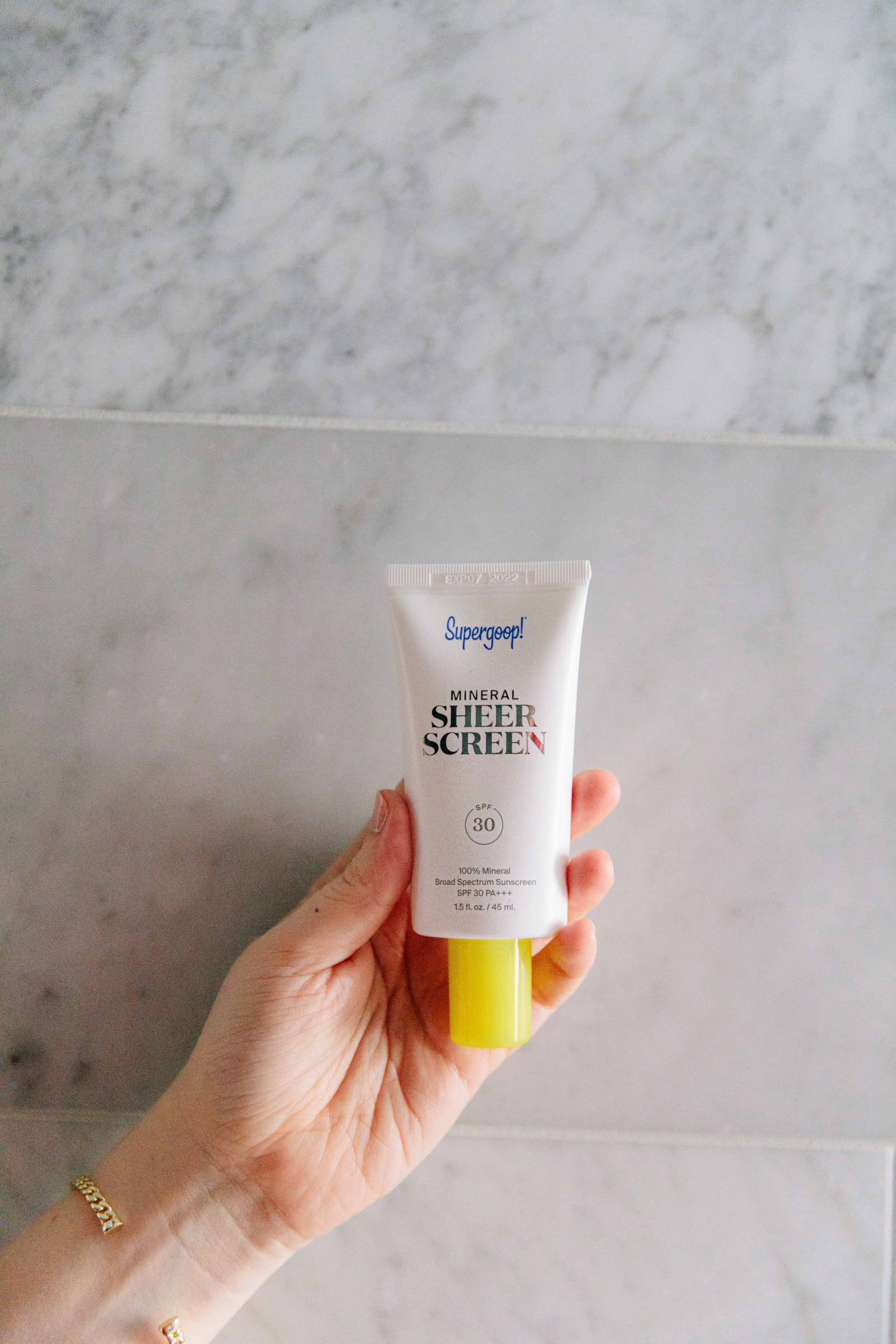
We all know using sunscreen is essential but there’s still so much confusion around what kind of sunscreen to use, how often to reapply and how we can actually use SPF to better protect ourselves from sunburns, sun damage, premature aging and skin cancers like melanoma.
Keep in mind as you read that I am not a dermatologist and if you’re looking for the best recommendations for your personal skin, please ask a derm for a recommendation! And as my derm always says “the best spf is the one you will wear every day!”
Sun protections falls into one of two categories: chemical and mineral (also known as physical.)
What is the difference between Chemical and Mineral sunscreens?
Chemical and Mineral sunscreens differ in their active ingredients. They also provide sun protection in different ways. Chemical and mineral sunscreens are not created equal and to continue my advocacy for skin cancer awareness, I’m dedicating this post to explaining why it’s better to use mineral sunscreens rather than chemical sunscreens.
After I was diagnosed with skin cancer in 2019, my dermatologist gave me strict instructions: no using moisturizers or makeup with SPF as my primary form of face sunscreen and use mineral sunscreens above SPF30 with active ingredients zinc oxide or titanium dioxide – that’s it.
What is mineral sunscreen?
A completely mineral sunscreen means that it only uses zinc oxide or titanium dioxide as its sunscreen actives.
Why Mineral Sunscreen is Better
Zinc Oxide and/or Titanium Dioxide are the two best, most powerful, most protective active ingredients available that actually shield you from the sun’s UV rays. They are the most effective sunscreen ingredients at protecting your skin. Period.
Yet, to add to the confusion, now brands are marketing sunscreens as mineral that don’t have either of these ingredients or they include one plus other actives. It’s important to note that in order for a sunscreen to be 100% mineral, it must only use these sunscreen actives (or just zinc oxide), and nothing else. A lot of sunscreens on the market claim they are mineral. But if you look closely, there are some chemical actives sprinkled in the ingredient list. Be sure to check the active ingredient list before you purchase something based on a quick glance or on the marketing alone!
Here’s what to know about why mineral sunscreen is better:
More effective active ingredients
Titanium Dioxide and Zinc Oxide sit on the top of skin to provide a physical shield against the sun’s UVA and UVB rays. This will help keep skin protected from harmful sun damage which can lead to a variety of skin cancers.
Safer ingredients
Because these ingredients are designed to sit on top of skin, less of the ingredients get into your blood stream which over time is better for you.
Go to work faster
Mineral sunscreens go to work right away after you apply them. So you don’t have to worry about waiting for them to absorb.
Last longer
Physical sunscreens often can last longer than chemical sunscreens. Be sure you follow the formula’s specific instructions though and always be sure to reapply throughout the day.
Less irritating
Chemical sunscreens can be really aggravating to some people’s skin. Zinc Oxide and Titanium oxide are often better for sensitive skin. And many brand’s formulas are designed specifically for people with sensitive skin, too. If you have acne-prone skin, mineral sunscreens are also recommended.
Both zinc oxide and titanium dioxide are known to cause less irritation or any sort of skin reaction. Zinc oxide also boasts some anti-inflammatory properties so it can help soothe acne.
. . .
I haven’t used chemical sunscreens since I was diagnosed with skin cancer and had my cancer removed. And I’m grateful to say I’ve been cancer free for two years now following added precaution and a switch to entirely mineral SPFs with only zinc oxide and/or titanium oxide.
I’ve been on a journey the past two years to try out the majority of the sunscreens on the market featuring these ingredients. Some are bad, some are ok and some are pretty great. Below are the best of the best that I’ve tried over the years.
Best Mineral Sunscreens

Supergoop Sheer Screen
This sunscreen lives up to its name as it blends in to a sheer finish. It layers well over your skincare routine making it a seamless edition. Read my Supergoop Sheer Screen review. I reach for this on days where I won’t be in the sun for long periods of time.
Supergoop Zinc Screen SPF 40
The Supergoop Zinc Screen is my go-to for the past two years as my face sunscreen of choice. Makeup applies easily over it making it a great choice for daily wear. And I like that it has an SPF 40. It’s lightweight and I love that the formula also combats blue light transmitted from your phone and computer. It has a slight tint to it as well to combat any white cast. It was specially designed to blend out onto skin easily and also brighten skin with application.
Elta MD Broad Spectrum UV Clear SPF 46
Beloved by dermatologists, this doctor-formulated SPF is great for sensitive skin. It provides protection to your complexion to shield your skin from harmful UVA and UVB rays and is fragrance-free. The formula includes sodium hyaluronate to moisturize while lactic acid refines the skin to clear pores and reduce shine meaning skin gets better with use of this SPF over time. Win/win! I generally reach for this on days where I’ll be in the sun for prolonged periods of time.
La Roche-Posay Anthelios SPF 50 Mineral Sunscreen
This gentle lotion was specifically formulated for sensitive skin and is one of the best mineral body sunscreens I have tried. There is a slight white cast after rubbing it in but not as bad as many others I have tried.
Beautycounter Countersun Mineral Sunscreen Lotion SPF 30
This mineral body sunscreen has won Allure’s coveted Best of Beauty award which means you know it is good! It’s one of only two body sunscreens that have gotten my stamp of approval because of its lightweight formula. Which means it is easier to rub in than most of the mineral sunscreens for body on the market.
It’s water-resistant making it great for beach, pool & park time and is formulated with non-nano zinc making it reef friendly.
Colorscience Sunforgettable Brush On Shield SPF 50
This award-winning mineral sunscreen brush is filled with Titanium dioxide and Zinc oxide SPF powder that makes reapplication on the go easy and effective. It won’t mess up makeup and can be applied over your face whenever you need a touch up. Pro tip? Dab the powder on your part, too! Toss it in your purse, gym bag or glove compartment for effortless sun protection on the go.
Versed Guards Up Daily Mineral Sunscreen Broad Spectrum SPF 35
This award-winning mineral face SPF has a bit of a tint to it so that the white cast is nearly entirely eliminated making for easy and on-the-go application and it makes this SPF a nice option for essentially all skin tones. It feels more like applying a lightweight moisturizer than an SPF which I really appreciate and it was designed to provide three-way protection against the elements—environmental pollution, electronic pollution (from screen time), and of course, the sun. Its oil-free formula with a creamy texture has a natural finish—not too dewy, not too matte.
Supergoop Bright Eyed Eye Cream SPF 40
This eye cream helps to diminish the appearance of dark circles and puffiness to refresh tired-looking eyes while providing you with SPF protection and shielding skin from the damage caused by blue light.
. . .
Invisible Mineral SPF or Mineral Sunscreens without White Cast
The technology of minimizing the white cast that zinc oxide and titanium oxide give off is getting better. But note there is no such thing as an “invisible” mineral sunscreen or a mineral sunscreen without a white cast entirely. (Zinc oxide and titanium oxide as ingredients are both white powders!) Some brands add a slight hue or tint to their formulas so that the white tint is more hidden. But this is generally different than wearing a tinted SPF.
Real talk: if a sunscreen is really and truly 100% mineral, it will never be invisible on your skin, no matter what color it is.
How do I know if my SPF is Mineral?
Sunscreen is regulated by the FDA as an over-the-counter drug so the active ingredients must be listed on the package under Active Ingredients (usually under the section entitled Drug Facts). If you see Titanium Oxide or Zinc Oxide listed – it’s mineral! Any other actives listed means it is NOT a mineral sunscreen.
What is Non Nano Zinc and why does it matter?
More and more SPF formulas are featuring non-nano zinc oxide because they will sit better atop your skin (without seeping into your blood stream) and they are better for the world’s oceans. (There is a belief that common SPF ingredients oxybenzone and octinoxate are potentially harmful to the ocean’s ecosystem).
And don’t forget that hats and clothing with SPF can actually be two great additional layers of protection to add to your arsenal of preventing sun damage.
I hope you found this post helpful and that it inspires you to switch over to mineral sunscreens exclusively!
You May Also Like:
- How to Get Started in Clean Beauty.
- My Favorite Eye Creams.
- Best Affordable Clean Beauty Products I Love.
Thank-you for posting this important information – I am saving it as a shopping guide for sunscreens!
A true advocate for skin cancer awareness would encourage people to wear sunscreen, full stop. The fearmongering around chemical / organic sunscreens is so dangerous and irresponsible. People don’t get skin cancer because they wore chemical sunscreen. Please do not play dermatologist and perpetuate these myths.
I learned so much from this post! Although I’ve most recently used three of your recommendations above (yay), I didn’t know that seeing other actives (beyond Zinc Oxide and Titanium Oxide) on the label means it’s NOT a mineral sunscreen. Thank you so much for passing along the knowledge with me. My skin thanks you too!
So glad you found it helpful, Ariana!
This post was so helpful! My younger sister had a pre-cancerous mole removed last year and she is only 20. It has made me so conscious of sun protection. If any of your readers are looking for more affordable mineral sunscreens, I love the Hawaiian Tropic Mineral Sun Milk. It’s $11 at Target and lightweight enough to wear every day.
So great to hear about this rec- I’m definitely going to look into it!